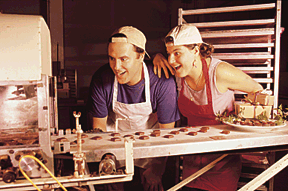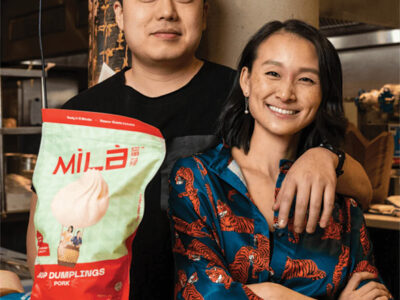
Photo by Candace diCarlo
“Coming up with a concept is easy,” says John Doyle. “Figuring out how to do it is something else entirely.”
It’s a toothsome challenge. Doyle and Kira Baker C’97 GEd’99 are the founding partners of John and Kira’s Jubilee Chocolates, the West Philadelphia-based, socially conscious line of hand-crafted chocolates.
Partners in business and romance, Doyle and Baker founded Jubilee Chocolates in 2000, initially testing and tasting in their West Philadelphia apartment. He had left an investment-banking firm in New York to chase his altruistic inclinations and salve his entrepreneurial itch. She was a student teacher who, as an Americorps Scholar at Penn, helped establish The School Store, a nutrition-education initiative at Turner Middle School at 59th Street and Baltimore Avenue.
Together, they decided to develop a unique product “promoting a different idea of a way to do business,” says Baker. “The community feeds us, and we feed the community.” They settled on the Jubilee name because it denotes celebration, rejoicing and, in Biblical references, the sharing of plenty throughout society.
The young chocolate-makers patronize local growers for key ingredients, like raspberries from nearby Lancaster County and honey from a West Philadelphia apiarist. And they give careful attention to such social issues in the industry as cocoa-plantation slavery by importing their organic chocolate from European growers who pay their employees fair wages and support sustainable agriculture.
In his search for a business venture, Doyle toured urban and college centers along the East Coast and returned thinking that chocolate could be to this decade what coffee was to the ’90s. He studied a classic French chocolate-making technique with local chocolatiers, read trade books for pastry chefs, and spoke with “anyone who would talk to me about chocolate.” Learning chocolate-making—a mix of art, science, and chance —was by turns enjoyable and exasperating for the couple. Doyle quickly learned that chocolatiers keep trade secrets under their toques. “It’s basically like one big mystery that we’re cracking,” he says.
There are other challenges. “We probably have several miniature heart attacks a week,” says Baker. Did the chocolate sent by express mail to an important customer arrive intact? Should they really spend an entire day creating a handful of papier-mâché boxes for their artful product? They wrestle with bigger issues, too, such as how to ensure that the chocolates meet Jubilee’s ambitious social agenda—and how to balance day jobs with building a business.
In the early days, Doyle and Baker converted their time and their paychecks into chocolate, though by this past spring Jubilee had turned enough profit for Doyle to leave his job as account manager at the Wharton School’s Career Management Program and devote himself to the business full-time. They keep their start-up costs to a minimum by doing the lion’s share of work themselves, and by enticing friends—with chocolates, of course—to assist. They also have learned to temper their optimism with a dose of realism. “You realize you can’t do everything in the world,” Baker says.
Doyle and Baker hand-craft the chocolates in marathon sessions at a site in Northeast Philadelphia. At the center of each one is the ganache, an emulsion of cream and chocolate. After infusing the cream with natural flavors—steeping it with fresh mint, for example, or mixing in a finely ground paste of pistachio nuts—they pour the hot cream over chopped-up bits of chocolate. (Doyle calls the centers—which draw on original recipes and non-traditional combinations like Bergamot tea and orange—the “jewels” of the confection.) The ganache is then poured into a frame and left to set in a cool atmosphere for two days before being put through a special machine called a “guitar,” which cuts it into squares. The squares are then put through a “temperamental” second-hand enrober, which covers them with a thin layer of dark chocolate. (Originally, Doyle and Baker dipped each one by hand with a dipping fork, which severely limited their production; now they use dipping forks to etch each chocolate’s individual design on top.)
The candies are wrapped in simple brown boxes—the assortments range from four to 50—finished with straw ribbon. They can be viewed and purchased at (www.jubileechocolates.com), which also tells the story behind each flavor and details Jubilee’s community and social commitments. Philadelphia-area chocolate-lovers can also look for them at Metropolitan Bakery’s two Philadelphia stores, on the dessert menus of the White Dog Café and RX restaurant, and at the White Dog’s sister store, the Black Cat.
For Baker, who begins doctoral work at the Graduate School of Education this month, the venture is a “natural progression.”Complementing Doyle’s vision and business savvy, Baker is Jubilee’s social conscience, drawing on her service-learning experiences and community contacts she gained while studying at Penn.
Dr. Ira Harkavy C’70 Gr’79, associate vice president and director of the Center for Community Partnerships at Penn, describes Baker’s work as “exemplary” in its “successful effort to create a reciprocal relationship between education and business, campus and community.”
In Drew Garden Mint, one of Jubilee’s original confections, the mint itself was originally grown in the garden at Drew Elementary School at 37th Street and Lancaster Avenue, and is now cultivated by nutrition and agricultural-science students in the sun-bathed rooftop greenhouse at University City High School. The gardening program is part of Penn’s Urban Nutrition Initiative, a school-based health project supporting the West Philadelphia community. “We hope people know that by buying our chocolate, they are supporting Drew’s garden,” Baker says.
The dedication of Jubilee Chocolates to community outreach is also evident in the way Baker and Doyle market their candies. They offer workshops, tastings, and presentations on their confections’ origins to demonstrate that “chocolate is one piece of a much larger puzzle,” in Baker’s words.
Colleagues at Penn have supported Doyle and Baker in their start-up effort. Law students and faculty at the Small Business Clinic of the Law School helped them incorporate and offered guidance on administrative and regulatory issues. “The clinic assists dozens of businesses a year,” says faculty supervisor Dina Schlossberg, a lecturer at the Law School, “but Jubilee Chocolates is one of the few that’s come across with that kind of purpose and mission.”
Although Jubilee turns out a boutique-scale 4,000 pieces of chocolate a month, Doyle acknowledges that number “could change pretty dramatically” as they reach out more aggressively to hotels, restaurants, and corporate accounts. In eight to 10 years, he adds, “we’d like to grow it into maybe a $7-$10 million business,” which would translate into nearly 25,000 chocolates a day. Think Ben & Jerry’s, he says, and you’ll get an idea of what a sweet-tasting, socially conscious business plan is all about.
—Jennifer Baldino Bonett




